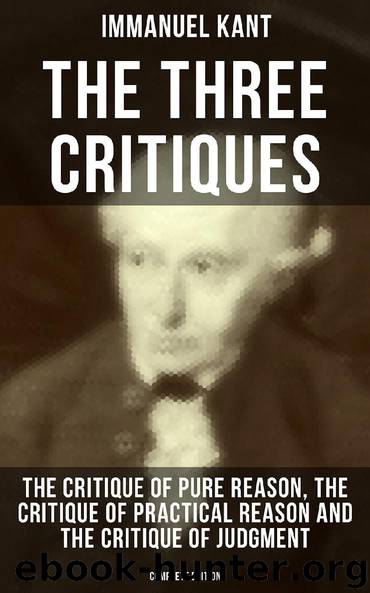The Three Critiques: The Critique of Pure Reason, The Critique of Practical Reason and The Critique of Judgment (Complete Edition) by Immanuel Kant

Author:Immanuel Kant [Kant, Immanuel]
Language: eng
Format: epub
ISBN: 9788027235599
Publisher: Musaicum Books
Published: 2017-12-08T00:00:00+00:00
Section III. Of Opinion, Knowledge, and Belief.
Table of Contents
The holding of a thing to be true is a phenomenon in our understanding which may rest on objective grounds, but requires, also, subjective causes in the mind of the person judging. If a judgement is valid for every rational being, then its ground is objectively sufficient, and it is termed a conviction. If, on the other hand, it has its ground in the particular character of the subject, it is termed a persuasion.
Persuasion is a mere illusion, the ground of the judgement, which lies solely in the subject, being regarded as objective. Hence a judgement of this kind has only private validity — is only valid for the individual who judges, and the holding of a thing to be true in this way cannot be communicated. But truth depends upon agreement with the object, and consequently the judgements of all understandings, if true, must be in agreement with each other (consentientia uni tertio consentiunt inter se). Conviction may, therefore, be distinguished, from an external point of view, from persuasion, by the possibility of communicating it and by showing its validity for the reason of every man; for in this case the presumption, at least, arises that the agreement of all judgements with each other, in spite of the different characters of individuals, rests upon the common ground of the agreement of each with the object, and thus the correctness of the judgement is established.
Persuasion, accordingly, cannot be subjectively distinguished from conviction, that is, so long as the subject views its judgement simply as a phenomenon of its own mind. But if we inquire whether the grounds of our judgement, which are valid for us, produce the same effect on the reason of others as on our own, we have then the means, though only subjective means, not, indeed, of producing conviction, but of detecting the merely private validity of the judgement; in other words, of discovering that there is in it the element of mere persuasion.
If we can, in addition to this, develop the subjective causes of the judgement, which we have taken for its objective grounds, and thus explain the deceptive judgement as a phenomenon in our mind, apart altogether from the objective character of the object, we can then expose the illusion and need be no longer deceived by it, although, if its subjective cause lies in our nature, we cannot hope altogether to escape its influence.
I can only maintain, that is, affirm as necessarily valid for every one, that which produces conviction. Persuasion I may keep for myself, if it is agreeable to me; but I cannot, and ought not, to attempt to impose it as binding upon others.
Holding for true, or the subjective validity of a judgement in relation to conviction (which is, at the same time, objectively valid), has the three following degrees: opinion, belief, and knowledge. Opinion is a consciously insufficient judgement, subjectively as well as objectively. Belief is subjectively sufficient, but is recognized as being objectively insufficient.
Download
This site does not store any files on its server. We only index and link to content provided by other sites. Please contact the content providers to delete copyright contents if any and email us, we'll remove relevant links or contents immediately.
| Anthropology | Archaeology |
| Philosophy | Politics & Government |
| Social Sciences | Sociology |
| Women's Studies |
The Bloomsbury Encyclopedia of Philosophers in America From 1600 to the Present by Shook John R(1192)
The Swerve by Greenblatt Stephen(1151)
Friedrich Nietzsche by Curtis Cate(1014)
History Of Western Philosophy by Bertrand Russell(896)
The Swerve: How the World Became Modern by Stephen Greenblatt(797)
Mere Christianity by Lewis C. S(797)
The Birth of Tragedy by Friedrich Nietzsche(758)
Beyond Fate by Margaret Visser(634)
The Great Divorce by C. S. Lewis(596)
The Forbidden Universe: The Origins of Science and the Search for the Mind of God by Lynn Picknett & Clive Prince(573)
The Age of Wonder: The Romantic Generation and the Discovery of the Beauty and Terror of Science by Richard Holmes(572)
El Mundo de Sofía by Jostein Gaarder(560)
God and the Atom by Victor J. Stenger(495)
Freedom's Right by Axel Honneth(483)
A Discourse on Inequality by Jean-Jacques Rousseau Maurice Cranston (translator)(461)
How to Think About the Great Ideas by Mortimer J. Adler(458)
Leviathan by THOMAS HOBBES & MICHAEL OAKESHOTT & RICHARD S. PETERS(453)
Existentialism and Excess: The Life and Times of Jean-Paul Sartre by Gary Cox(425)
The Hedgehog and the Fox by Ignatieff Michael Hardy Henry Berlin Isaiah(424)
